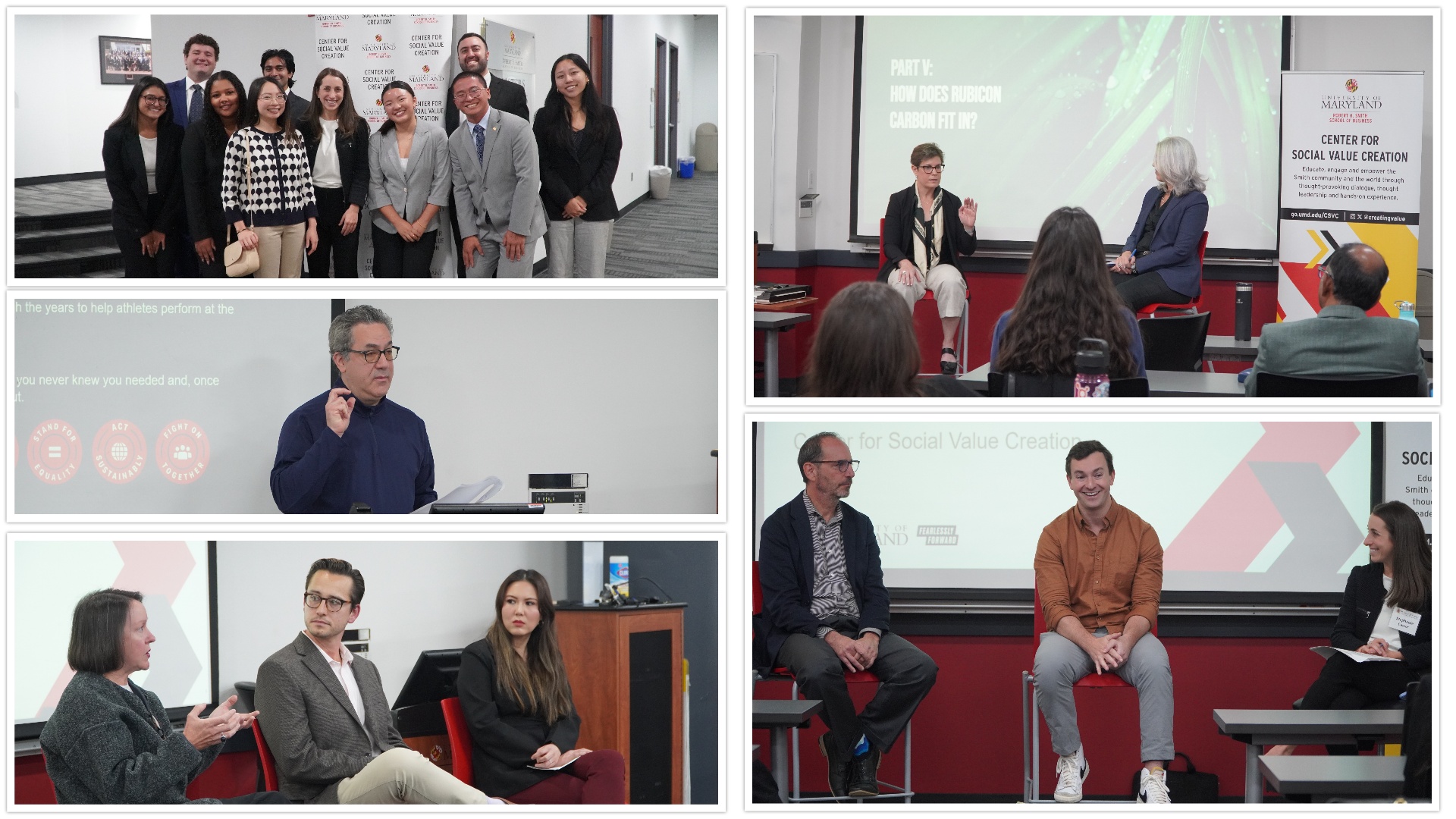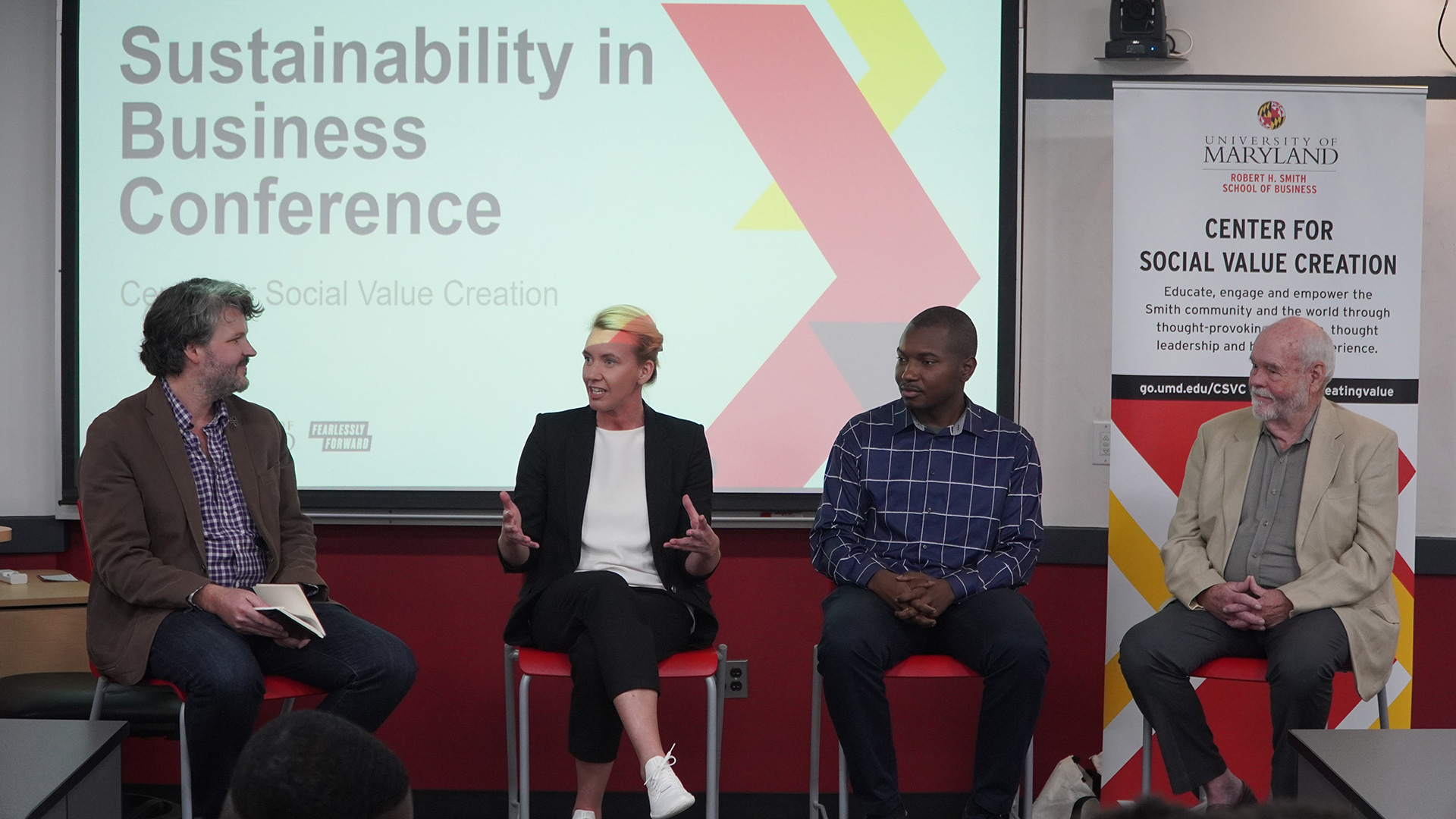
The Center for Social Value Creation hosted its first Sustainability in Business Conference to bring industry experts, policymakers and researchers together to discuss recent developments and ongoing challenges as business leaders work toward global sustainability goals.
The Challenges To Get To Net Zero
Jennifer Jenkins, EMBA ’16, chief science officer at Rubicon Carbon, spoke to conference participants about how leading companies are working to meet their targets, saying that it is a difficult concept because the goal is adding no new emissions to the atmosphere. “I think people don’t appreciate how difficult this is. It’s not just the energy; it’s everything,” she said, adding that once companies commit to achieving net zero, they have to figure out how to get there, which involves the difficult task of exploring emissions challenges along the supply chain as well.
Jenkins started her career as a scientist, working in government and academia, but said she was hungry for impact, which prompted her to pursue an Executive MBA at the Robert H. Smith School of Business. “In business we actually do the thing which I find so refreshing,” she said. Jenkins is a co-recipient of a 2007 Nobel Peace Prize as part of the Intergovernmental Panel on Climate Change (IPCC) team’s work on climate, along with former Vice President Al Gore.

Creating Social Value
Alumni Dave Feldman ’84, MBA ’91, Executive Director at Bethesda Green and Evan Lutz ’14, CEO and Founder at Hungry Harvest, who both happen to be third-generation Terps, shared their insights on getting a social enterprise off the ground. Though both are in the business of sustainability, Lutz said that adding social value does not have to mean solving world hunger or climate change. He referenced large corporations like Costco, which make sure their employees are taken care of, adding that social value creation is how you run your business as well, not just what your business serves to achieve.
The entrepreneurs shared that if you have an idea and believe in something, stay with it. Also, start small and make friends with companies you want to align your business with.
Driving Long-Term Business and Innovation Through Sustainability Efforts
Michael Levine, Under Armour's Chief Sustainability Officer, spoke to conference participants about the importance of taking a holistic approach to sustainability and how it can drive long-term business success and innovation. He discussed Under Armour’s sustainability focuses, including materials innovation, circular design and collaboration within the industry. Levine also highlighted case studies like Fiber shed and Neolast to demonstrate continuous improvement and how business practices can align with sustainable development goals.
Humanitarian Rights & Climate Justice
Speakers Garrett Zink ’14, director of social impact at Marriott International and Lisa Manley, a sustainability leader who has worked with and consulted numerous Fortune 100 companies, including Mars Inc., on integrating social and environmental sustainability into business strategy, talked about working globally with moderator and Smith faculty member Niratcha “Grace” Tungtisanont. The panel discussed the intersection of environmental and social issues. Zink referenced Marriott’s work to ensure safety while traveling. The hotelier created a custom training in 2016 for employees to identify possible human trafficking issues and has since trained over 1.2 million associates. It also provided this training to smaller hospitality companies or hotels for free.
Manley brought attention to other humanitarian issues, like climate change and its impact on a community. She said it is essential to bring more voices to the table to discuss and address these challenges, adding that there is always controversy and working with the right local partner is important to advance any human rights intervention in a culturally sensitive way.
They both agreed that all departments within an organization need to work together. Manley said at Mars, the chief sustainability officer was also the chief procurement officer, noting that having one person in that dual function is powerful.
“You really start to see the needle move when you see the silos broken down,” Garrett added.
Manley noted the importance of events such as the Sustainability in Business Conference in offering a forum for business community members to participate in impactful conversations about these pressing issues and their potential solutions. “Each of you will ensure [these conversations] continue.”
Media Contact
Greg Muraski
Media Relations Manager
301-405-5283
301-892-0973 Mobile
gmuraski@umd.edu
About the University of Maryland's Robert H. Smith School of Business
The Robert H. Smith School of Business is an internationally recognized leader in management education and research. One of 12 colleges and schools at the University of Maryland, College Park, the Smith School offers undergraduate, full-time and flex MBA, executive MBA, online MBA, business master’s, PhD and executive education programs, as well as outreach services to the corporate community. The school offers its degree, custom and certification programs in learning locations in North America and Asia.